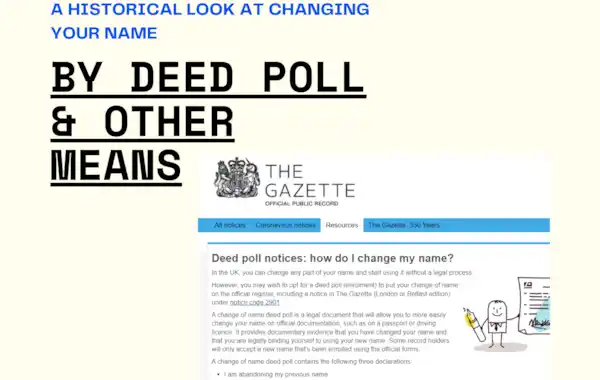Family history can be hard enough, but when people go and change their name tracking them down can be even harder. In his article in the July 2024 issue of Family Tree, Chris Paton explains the nature and practicalities of changing your name over the centuries.
Can anyone change their name in the UK?
Chris Paton writes: "Whilst no documentary procedure was required by the state to be carried out to register a change, some institutions may have required physical forms of proof." This is important to remember, when doing family history - different rules will have applied at different time periods.
For instance, during WW2, there was a more restrictive situation with regards to change of name. Chris Paton: "In the Second World War it was [...] a requirement that anyone wishing to change their name had to make a statutory declaration to do so, and to announce their intention three weeks in advance via the London Gazette, or its equivalents in Edinburgh and Belfast. Although these documents were destroyed in 1952, the Gazetted entries can be searched at www.thegazette.co.uk.
Chris Paton also writes: "For much of history it has been perfectly legal within the UK to adopt a different surname at any time to that which was ascribed to a person at birth, so long as the name is not changed for fraudulent purposes.
"There have been historic exceptions to this. From 1916 to 1971, for example, it was forbidden for foreigners living in Britain to change their names, with a parliamentary act introduced in the First World War specifically applying to enemy aliens, and later extended to all foreigners. The only exceptions were for women marrying, if special permission had been sought by the Home Office, or if a new name was granted by royal licence."
Can a person's name be changed?
Name change by ‘deed poll’
For those born in England and Wales, it has been possible to record a name change by ‘deed poll’, a copy of which may or may not have been deposited subsequently with a solicitor.
A very small number of such documents have been registered via an expensive procedure through the Supreme Court of Judicature, with the National Archives at Kew holding copies of the records prior to the year 2003. The archive has a detailed guide online explaining how to search for them from 1851-1903 (indexes are catalogued under C 275), 1904-1944, and 1945-2003 (indexed through J 18).
Name change by royal licence & private Acts of Parliament
The same guide (see the link above) also describes how to search for name changes recorded through royal licences, particularly common in the 18th and 19th centuries, and which are also announced in the Gazette, as well as private Acts of Parliament prior to 1907, which can be searched for at www.legislation.gov.uk.







